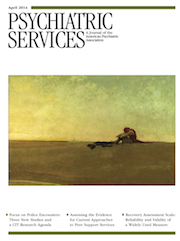This Month’s Highlights
Two AEB Series Reviews
Two literature reviews on evidence-based practices for people with serious mental illness are featured this month—one on a well-established intervention and the other on a newer approach that is attracting a broad stakeholder base. The authors of the first review, on consumer and family psychoeducation, found more than 30 randomized controlled trials (RCTs) of consumer psychoeducation and more than 100 RCTs of family psychoeducation, yielding a high level of evidence for the effectiveness of both interventions. D. Russell Lyman, Ph.D., and colleagues documented consistent findings of improved treatment adherence and lower hospitalization rates among consumers, along with improvements in functioning, satisfaction with services, and quality of life. The review also found that participation in multifamily psychoeducation groups is associated with significantly improved problem-solving ability and a reduced burden on families (page Original article: 416). The development of peer support services was given impetus by the 2003 New Freedom Commission’s report, which called for recovery-oriented care that aims to help those with mental illness achieve a satisfying life, even in the presence of symptoms. Matthew Chinman, Ph.D., and colleagues examined research on three types of peer support services—peers added to traditional services, peers in existing clinical roles, and peers delivering structured curricula—and found moderate evidence for each type (page Original article: 429). The articles, which were peer reviewed by a special panel of Psychiatric Services reviewers, are part of the SAMHSA-funded Assessing the Evidence Base (AEB) Series, being featured in the journal throughout 2014.
Police Encounters
Encounters with individuals who have mental illness account for only a small proportion of police emergency calls. However, the repetitive nature of these situations and their sometimes fatal outcomes have spurred advocates and law enforcement personnel to seek changes. Findings from a Montreal study illustrate the heavy demands that such calls place on police resources. In an analysis of data from more than 6,100 police encounters, Yanick Charette, M.Sc., and colleagues found that those involving people with mental illness (4.4%) were more likely to result in arrest, even though the offenses were less severe, and that officers spent nearly twice the number of work hours handling such calls (page Original article: 511). A widely implemented approach is the crisis intervention team (CIT) model, in which police officers receive 40 hours of specialized training to become first responders to calls involving people with mental illness. In a two-part study, researchers measured the effects of CIT training both on officers’ knowledge and attitudes and on their behavior during emergency encounters. Michael T. Compton, M.D., M.P.H., and colleagues conducted in-depth assessments of nearly 600 officers with and without CIT training and found that such training resulted in sizable and persisting improvements in knowledge, attitudes, and self-efficacy (page Original article: 517). The effectiveness of CIT training was also supported by data from the trained officers’ emergency encounters, which were more likely to result in referral or transport to services, rather than arrest—a form of prebooking jail diversion (page Original article: 523). In a commentary, Fred C. Osher, M.D., calls for stronger partnerships between the criminal justice and mental health systems, with more clinician training on criminal proceedings (page Original article: 403). Finally, this month’s Open Forum reviews the conceptual framework of the CIT model and empirical evidence of its effectiveness. Amanda Brown Cross, Ph.D., and colleagues then outline research needs in this area. Their proposed agenda addresses two major gaps: verifying that changes in officers’ attitudes and skills translate into behavioral change and determining how criminal justice–mental health partnerships affect officers’ behavior (page Original article: 530).
Evaluating the Recovery Assessment Scale
Mental health systems strive to promote recovery by delivering services based on recovery principles. The Recovery Assessment Scale (RAS) appears to be the most widely used among the many instruments developed to evaluate these services and the outcomes associated with them. Is the RAS psychometrically sound? In a review of 77 published articles that included psychometric data on the RAS, Mark S. Salzer, M.A., Ph.D., and Eugene Brusilovskiy, B.A., M.U.S.A., found good evidence for internal consistency, test-retest reliability, and interrater reliability. Use of the RAS in mental health research can advance recovery science, they concluded (page Original article: 442).
Briefly Noted
The Integrated Care column describes an approach to “high-impact” mental health–primary care research for patients with multiple comorbidities (page Original article: 406).
New EEOC regulations give people with a criminal record a better chance at getting a job interview (page Original article: 410).



